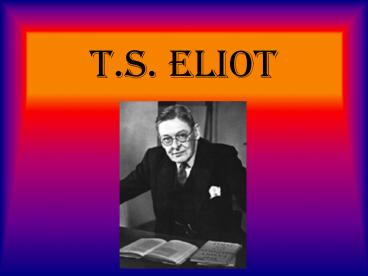T.S. Eliot - PowerPoint PPT Presentation
1 / 8
Title:
T.S. Eliot
Description:
His father, Henry Ware Eliot, was the president of the Hydraulic ... Ash-Wednesday. ( 1930). Anabasis, a Poem by St-John Perse (Eliot translation). ( 1930) ... – PowerPoint PPT presentation
Number of Views:2869
Avg rating:1.0/5.0
Title: T.S. Eliot
1
T.S. Eliot
2
Biography
- BIRTH AND DEATH
- On September 26, 1888 Thomas Stearns Eliot was
born in Missouri. In 1965, he died in London at
the age of seventy-seven. - CHILDHOOD
- His father, Henry Ware Eliot, was the president
of the Hydraulic Brick Company. His mother,
Charlotte Champe Stearns, was a volunteer at the
Humanity Club of St. Louis. Before becoming a
volunteer, she was a teacher. When he was born,
his parents were in their mid-forties and his
siblings were already grown. - EDUCATION
- He attended Harvard University and left with a
masters and undergraduate degrees. Later, he
returned to Harvard to receive a doctorate degree
in philosophy.
3
- OTHER PROFESSIONS
- Eliots professions included a poet, critic, and
editor. - CONTRIBTIONS TO LITERATURE
- The Waste Land, published in 1922, is said to be
the single most influential poetic work of the
twentieth century. - For the next thirty years following 1930, Eliot
was viewed to many people as the most dominant
figure in poetry and literary criticism in the
English-speaking world. - LITERARY INFLUENCES
- While attending Harvard, he discovered Arthur
Symonss The Symbolist Movement in Literature.
In this book, he found the poetic works of Jules
Laforgue. After reading Laforgues works, Eliot
became inspired.
4
Eliots Works
- Prufrock and Other Observations. (1917).
- Ara Vos Prec. (1919). Republished in the US as
Poems. (1920). - The Sacred Wood. (1920).
- The Waste Land. (1922).
- Homage to John Dryden. (1924).
- Poems 1909-1925 (includes "The Hollow Men").
(1925). - Sweeney Agonistes (in Criterion). (1926).
- For Lancelot Andrewes. (1928).
- Ash-Wednesday. (1930).
- Anabasis, a Poem by St-John Perse (Eliot
translation). (1930). - Selected Essays 1917-1932. (1932).
- The Use of Poetry and the Use of Criticism.
(1933). - After Strange Gods (1933 lectures at the
University of Virginia). (1934). - The Rock A Pageant Play. (1934).
- Murder in the Cathedral. (1935).
5
- Essays Ancient and Modern. (1936).
- Collected Poems 1909-1935 (includes "Burnt
Norton"). (1936). - The Family Reunion. (1939).
- Old Possum's Book of Practical Cats. (1939).
- The Idea of a Christian Society. (1939).
- East Coker. (1940).
- The Dry Salvages. (1941).
- Little Gidding. (1942).
- Notes Towards the Definition of Culture. (1948).
- The Cocktail Party. (1949).
- The Complete Poems and Plays, 1909-1950. (1952).
- The Confidential Clerk. (1954).
- On Poetry and Poets. (1957).
- The Elder Statesman. (1959).
- Collected Poems, 1909-1962. (1963).
- Posthumous publications
- The Waste Land A Facsimile and Transcript of the
Original Drafts Including the Annotations of Ezra
Pound, edited and with an introduction by Valerie
Eliot. (1971).Inventions of the March Hare Poems
1909-1917, featuring previously unpublished
works, edited by Christopher Ricks. (1996).
6
Awards Recognitions
- Eliot received
- the Hanseatic Gothe Prize in 1954.
- the Nobel Prize for Literature in 1948.
- the Order of Merit in January 1948.
- the Dante Gold Medal in 1959.
- Eliot was recognized as an Officier de la Legion
dHonneur.
7
(No Transcript)
8
Works Cited
- Academy of American Poets Online,
http//www.poets.org - Modern American Poetry, http//www.english.uiuc.ed
u/maps/poets.htm - Andrew and Eliot, http//cats.users5.50megs.com/an
dreand.htm































